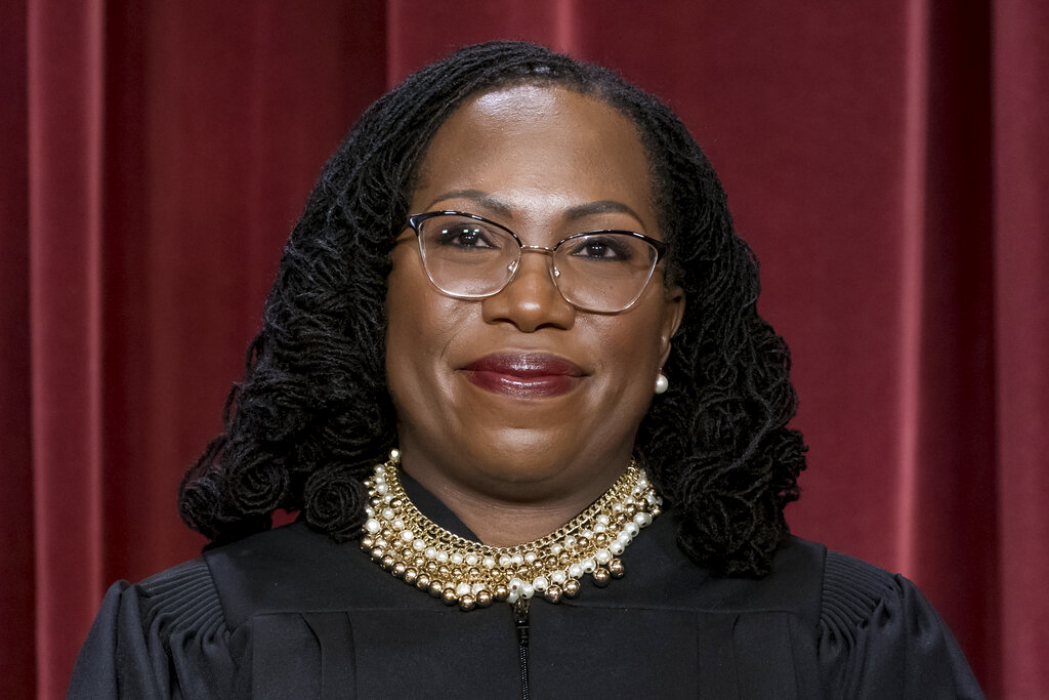Ketanji Brown Jackson was appointed to the Supreme Court by President Joe Biden on June 30, 2022. She replaced Justice Stephen Breyer who had retired.
Biden would likely have appointed her earlier had not Republicans rushed through the nomination of Amy Coney Barrett in the waning days of the Trump Administration, even though they had delayed a similar confirmation for Merritt Garland at the end of the Obama Administration. Although Jackson is neither the first Black person appointed to the court (that was Justice Thurgood Marshall) nor the first woman (that was Sandra Day O’Connor), she is the first Black woman. (Biden’s promise to appoint the first Black woman may largely be responsible for him winning the Democratic nomination (Waldman 2023, 139-140)). Jackson joined one other Black justice, Clarence Thomas, and three other women on the court.
Jackson held positions as public defender, vice chair of U.S. Sentencing Commission
Raised in Miami, Jackson was a champion debater who went on to study government and earned a law degree from Harvard University, where she was editor of the law review. She later clerked for a succession of three judges, including Justice Breyer. After working briefly in the private sector, she held a number of posts including assistant counsel to the U.S. Sentencing Commission and assistant federal public defender in the District of Columbia (the first individual with such experience to ever later be appointed to the U.S. Supreme Court). President Barack Obama appointed her a vice chair of the Sentencing Commission and later to a U.S. District Court judgeship in the nation’s capital. Biden elevated her to the U.S. Court of Appeals in the district and then to the U.S. Supreme Court.
Jackson is a nondenominational Protestant and became the second Protestant on the court when she was appointed. Justice Neil Gorsuch is an Episcopalian. As a district judge, she allowed a plaintiff to go forward with a case involving his allegation that he had been discriminated against and his position with the U.S. Postal Service eliminated because he played gospel music at work, even though other employees had been allowed to play secular music (Helfand 2022).
Senate approves Jackson’s confirmation 53 to 47
During her Senate confirmation hearings, Republicans, perhaps in a tip of the hat to the QAnon conspiracy theory that associated Democrats with pedophilia, unsuccessfully attempted to portray her as soft on child pornography. When U.S. Sen. Marsha Blackburn of Tennessee asked her to define the word “woman” — she responded that “I’m not a biologist” (Waldman 2023, 148).
When U.S. Sen. Jon Ossoff of Georgia asked her to describe some of the court’s greatest First Amendment cases, she mentioned rulings dealing with incitement, libel and prior restraint of publication (Lipsak 2022). In an analysis of her First Amendment jurisprudence and her opinions dealing with the Freedom of Information Act as a U.S. district judge, the Reporters Committee for Freedom of the Press observed that her decisions “demonstrate a deference to agency exemption claims, especially in the national security context, but a willingness to deny an agency summary judgment where government officials failed to provide sufficient evidence to keep records hidden from the public.”
Jackson was confirmed 53 to 47 in a largely partisan vote in which three Republicans joined a unanimous group of Democrats and one Independent to approve her nomination. In an emotional moment, U.S. Sen. Cory Booker of New Jersey expressed great joy in her appointment.
“I’m not letting anybody in the Senate steal my joy,” he said. “You’re a person that is so much more than your race and gender. You’re a Christian, you’re a mom, you’re an intellect, you love books. But for me, I’m sorry, it’s hard for me not to look at you and not see my mom, not to see my cousins, one of them who had to come here and sit beside you… You have earned this spot. You are worthy. You are a great American” (Waldman 2023, 149).
Jackson’s early voting record shows most alignment with Sotomayor
In United States v. Hansen (2023), Justice Jackson authored a dissent after the majority upheld a law that applied to an individual who had defrauded individuals seeking citizenship through a phony adoption scheme. The law had been challenged as being overly broad and interfering with legitimate speech. Jackson thought that it was Congress’ responsibility to express its sentiments more clearly and said the ruling might discourage that body from giving due attention to the language it employed if the court corrected its errors.
Her initial voting record on the U.S. Supreme Court showed that she most closely aligned with Justice Sonia Sotomayor (Dunn 2023). Because Jackson replaced a moderately liberal justice, it seems unlikely that her appointment will have the same impact on the ideological divisions on the court as the appointment of Barrett, who is perceived to be a conservative and replaced Ruth Bader Ginsburg, who was a liberal.
Although Jackson, who had served on the Harvard Board, recused herself from the Harvard Admissions case — Students for Fair Admissions, Inc. v. President and Fellows of Harvard College, 600 U.S. ____ (2023) — in which the Supreme Court struck down considerations of race in college admissions, she authored a sharp dissent in the corresponding North Carolina case in which she argued for the continuing efficacy of such considerations.
That same day, she joined Justice Sotomayor’s concurrence in Groff v. Dejoy, agreeing that an employer had to exert more than a de minimis effort to accommodate the religious practices of employees covered by Title VII of the Civil Rights Act of 1964. The next day, she also joined Sotomayor’s dissent in 303 Creative LLC v. Elenis, 600 U.S ____ (2023) objecting to the majority’s decision that the owner of a graphic design business that built wedding websites did not have to create websites celebrating gay marriages, which the owner opposed on religious grounds.

